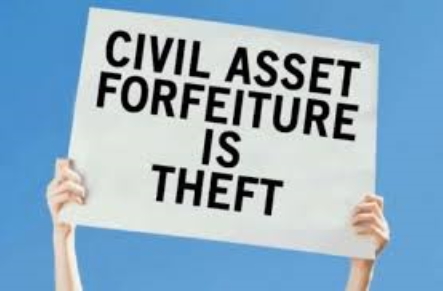
Civil Asset Forfeiture is Theft!
By Michael Boldin
Civil asset forfeiture is the process by which government confiscates a person’s property on the mere suspicion it was involved in a crime.
We consider this legalized government theft.
In contrast to criminal forfeiture, where property is taken only after a criminal conviction, civil forfeiture allows law enforcement to take property from innocent people who have never been formally accused of a crime, let alone convicted of one.
States can take a big step forward by ending CIVIL asset forfeiture and requiring a criminal conviction.
But that’s not the end of the story, unfortunately.
THE FEDS
“Equitable sharing” is a federal program that incentivizes state and local police to bypass state-level restrictions on asset forfeiture.
Both the Department of Justice and the Department of Treasury operate the program. Under the equitable sharing, local police seize assets they suspect were involved in criminal activity, sometimes without even making an arrest.
Through a process known as “adoption,” the feds prosecute the case under the looser federal forfeiture procedures and then return up to 80 percent of the proceeds back to the local cops. This allows police to circumvent conviction requirements and collect forfeiture funds even if the state process prohibits it.
Until recently, California faced this situation. The state has some of the strongest state-level restrictions on civil asset forfeiture in the country, but state and local police were circumventing the state process by passing cases to the feds. According to a report by the Institute for Justice, California ranked as the worst offender of all states in the country between 2000 and 2013. In other words, California law enforcement was passing off a lot of cases to the feds and collecting the loot. The state closed the loophole for a vast majority of situations in 2016.
In recent years, a growing number of states have ended civil asset forfeiture on the state level. And we’ve been pushing more to opt out of the federal program too.
Here are the latest efforts on each.
BOTH STATE AND FEDERAL
- Alabama HB120 would end both programs in a vast majority of situations. Read about it here
- South Carolina H3968 takes the same approach, and now has a whopping 101 cosponsors!
- Massachusetts is rated the “worst in the country” on asset forfeiture. And H3367 would take big steps towards ending both the state and federal programs there. Read more here
FEDERAL OPT OUT
- Missouri HB1776 would ban participation in equitable sharing. It has good state-level laws, but they’re being ignored because of the federal program. Learn more here
- New Hampshire HB1192 isn’t as strong as the Missouri bill, but still addresses more than 85% of the federal program. It’s up for a hearing and vote on Mar 3.
STATE ONLY
- Arizona has already opted out of much of the federal program, so 2 bills this year address the state program. Learn more here
- Hawaii HB2069 would require a conviction a follow up for the federal program will be needed. The same goes for West Virginia HB2563.
I hope you find this information interesting – and educational. I’m so thankful for the opportunity to be able to not only help people learn things – but also provide them tools they can use today to help advance liberty.
Thank you so much for being a part of this with us! We couldn’t be more grateful for your support – large or small – it all helps us make a difference:
https://tenthamendmentcenter.com/members/
-Michael Boldin, TAC